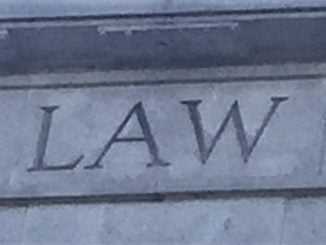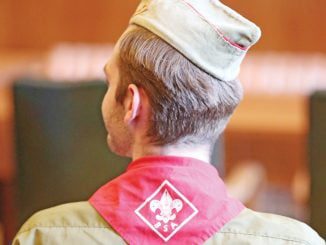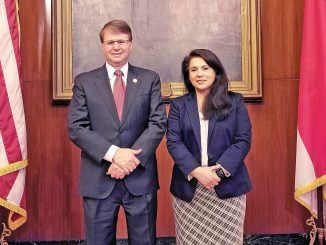RALEIGH — In a year where North Carolina saw multiple close races, the state Supreme Court’s 2020 chief justice race was the closest, with a 401-vote difference between the winner, Republican current Associate Justice Paul Newby, and Democratic incumbent Chief Justice Cheri Beasley.
“This is historic,” Newby told NSJ in a Dec. 14 interview. “I think you’d be hard-pressed to find a race anywhere in the country with 5.5 million people voting and the separation was 401 votes. I haven’t done the math, but I imagine it’s 50.0000-something to 49.9999-something.”
But with his opponent, Beasley, conceding the race, after pursuing multiple legal avenues and recounts, the election is set to be certified by the State Board of Elections.
“She called about 9:30 Saturday morning, and very graciously conceded the race,” Newby said. “She talked about how it was important for the best interest of the court and the judicial branch to bring some finality to the race and move on to the transition. She was very gracious.”
Newby’s win means Republicans achieved a total sweep of the eight statewide judicial races in the state.
“I think that North Carolinians in general favor judges that are conservative,” Newby said on the Republican victory. “What that means is that Republican judges have earned a reputation as those who understand separation of powers and understand that the role of the judicial branch is to follow the law as intended as opposed to legislating from the bench.”
“I think all those things come into play when people go into the voting booth and vote for judges,” Newby added. “So that’s why I think conservative judges had success this time.”
But Newby doesn’t just credit his win to North Carolina voters favoring his judicial philosophy. He also credits his family and supporters for helping him on the campaign trail.
“My wife is just wonderful,” Newby said. “In 2004 and 2012 [Newby’s other Supreme Court races], she had more responsibilities at home, as our four children were growing up; but this time we’re empty nesters.”
He said this allowed her to take a more active role, traveling with him to events and even doing events without him when he needed to be in another part of the state.
“People ask me what kind of a judge I am, and I say, ‘Well, exhibit A is my wife. I’m a great judge because I made a good choice there.’”
His daughter Sarah was also a major help in his campaign. Initially, he hired her to work on his campaign, but then in discussions with the other Republican judicial candidates, they all agreed it would make sense to pool their resources and have her work for all their campaigns.
“Sarah agreed to work for all eight. And I’m so proud of her, she just did an incredible job.”
Newby also said he is grateful to all those who volunteered on his campaign and during the recount process, as well as the team at the N.C. GOP and all those who voted for him, saying he was humbled by all the support, “and by God’s grace we’ll try to honor daily the responsibilities that they’ve placed in my hand.”
But with the campaign finally over, Newby has been able to reflect on what it will mean to rise to the highest judicial position in his home state.
“It’s so humbling. I’m the first lawyer in my family. Mom was a school teacher, dad, a printer. I had no idea I’d ever, frankly, have the privilege of being a lawyer, and then a justice, and now my goodness, chief justice. I’m so incredibly humbled and honored that the people chose me. It’s certainly my hope and my prayer that I have the wisdom and discernment and humility to properly lead the branch over this next term.”
As chief justice, Newby will not only be “first among equals” on the state Supreme Court, dealing with extra responsibilities like calendering cases, but will also be the head of the Administrative Office of the Courts. The AOC operates the state’s courts, setting rules in conjunction with Superior Court judges, District Court judges, magistrates, the clerks’ office, the registers of deeds and district attorneys.
“There are lots of opportunities to collaborate, to make suggested changes to the General Assembly and to be sure that all the parts of our justice system that take place in all 100 counties have the proper resources and support they need to administer justice,” Newby said.
A main issue Newby will be immediately faced with is to what degree courts should be open for business during the ongoing COVID-19 pandemic. His predecessor and campaign opponent, current Chief Justice Cheri Beasley, announced on Dec. 11 that the courts would be shut to non-essential business for 30 days due to an increase in cases across the state.
“I’m not a fan of centralized, top-down administrative orders, or things like that,” Newby said. “Again, I don’t have all the information, and I know there are different taskforces that are at work, but it’s my impression that each judicial district, with their Superior Court and District Court judges, clerks and sheriffs’ offices that supply the security, I think folks with boots on the ground have a lot better perspective than we do here in Raleigh because they know their courthouses, and they know their communities.”
Newby also said any talk of risk mitigation when it came to the courts during the pandemic would also have to be weighed against the “open courts provision” in Article 1 Section 18 of the state constitution.
“I am very conscious that we the people have said that the courts shall be open, so I think the local officials in collaboration with one another, are in a much better position than I in Raleigh would be to make those kinds of determinations.”
Newby is widely acknowledged as an expert in the N.C. Constitution, teaching courses on its content and history at Campbell University Law School. He said if there’s one thing people should know about the difference between the state’s constitution and the federal constitution, it’s that they’re “two totally different documents.”
The state constitution he describes as reserving all powers to the people (as expressed through the legislature) unless otherwise stated in the constitution, while the federal constitution assumes no powers to the federal government unless expressly stated in the document. Because N.C.’s constitution dates back to 1776, it actually predates the U.S. Constitution, so it is not modeled on the federal constitution like many other state constitutions are.
When asked when he’d start his term, considering the 45-day delay in certification, Newby returned to the state’s constitution.
“Under the constitution, those terms start on Jan. 1, so I suppose we will see. Clearly it’s got to be certified by the board of elections. So even though there’s a concession, it’s all about the technicalities and the paperwork. But we’re optimistic the board will go ahead and certify the election, all the appropriate paperwork will get completed and we’ll take our oath on Jan. 1.”



